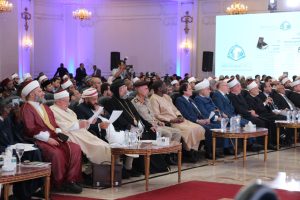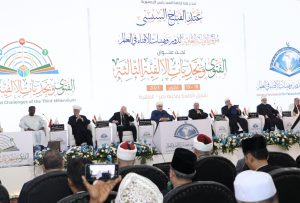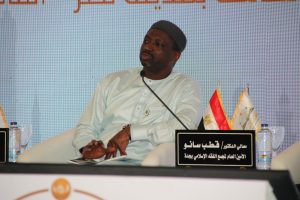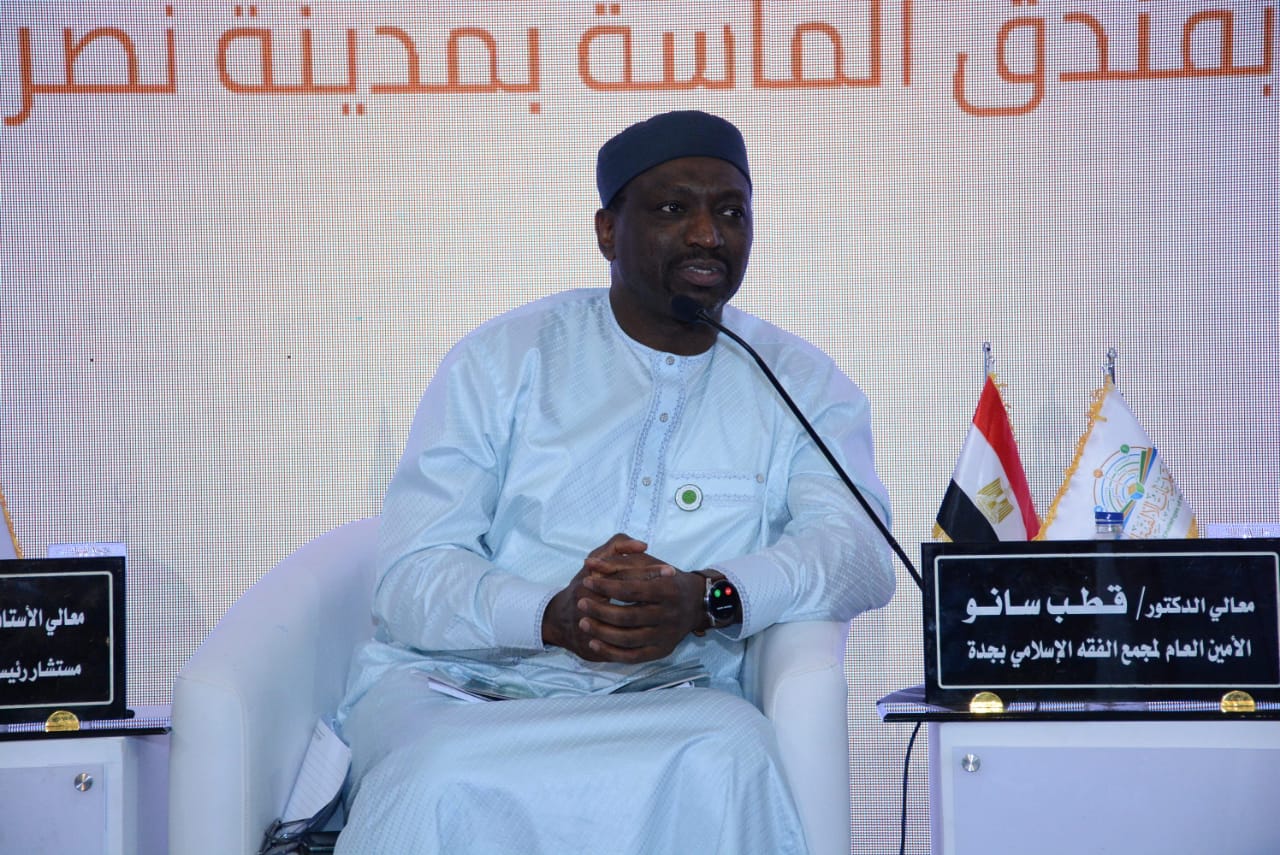Secretary General calls on Ifta Councils to adopt the Five Values to face up Third Millennium and its Challenges
In response to the kind invitation of the Egyptian House of Fatwa and the General Secretariat of Ifta offices and councils worldwide, H.E. Prof. Koutoub Moustapha Sano, Secretary General of the Academy, chaired the first scientific session of 8th International Conference concerning “Fatwas and the Challenges of the Third Millennium”, held in Cairo on Wednesday 3 Rabi Al-Akhir 1445, corresponding to October 18, 2023.
His Excellency began chairing the session entitled “Areas of Investigation and Methods of Confrontation” by referring to the importance of this conference, which is being held in difficult circumstances for the Ummah and the whole world due to the brutal aggression against the Palestinian people at the hands of the occupiers before the eyes of the whole world, emphasizing the solidarity of the International Academy of Islamic Fiqh and all fatwa councils worldwide, as well as all peace- and justice-loving peoples and nations in the world.
His Excellency welcomed the OIC’s firm stance on the Palestinian question, as it is a central issue that it will not hesitate to defend, and to advocate to the world its justice, until Palestine recovers all its occupied lands, and establishes its independent state, with its capital, Jerusalem. His Excellency also appreciated the positions of OIC member states, starting with the Arab Republic of Egypt, which have called for a world peace conference to find an urgent solution to end Israeli aggression against civilians in occupied Palestine. He also appreciated the efforts of the Kingdom of Saudi Arabia, which has also called for an exceptional conference of OIC foreign ministers, in the hope that the occupying forces will cease their brutal attacks on defenseless civilians.
His Excellency explained that the challenges facing the fatwa and its institutions in the third millennium, twenty-three years of which have already passed, are many and varied, involving intellectual, social, cultural, economic and political challenges, as he pointed out. These challenges will neither stop nor decline, but on the contrary are constantly increasing, hence the urgent need to transform them into opportunities that enable the fatwa and its institutions to carry out their great tasks of advice and guidance in order to achieve the success of the true religion and guide life through its teachings and laws.
 To this end, His Excellency presented five practical methods or values for facing up to the challenges of the third millennium and transforming them into opportunities that serve Ifta and make it an influential and present tool with power and action. His Excellency called his proposal the five values, which are “Institutionalization, credibility, follow-up, methodology and professionalism.” With regard to institutionalization, we mean that the fatwa moves from an individual action to an organized institutional action that overcomes the improvisation, chance and chaos that surround it today on all sides. This requires close monitoring of the various problems and challenges that have accumulated, in order to determine the means and methods for dealing with them in a sober manner, based on the drafting of laws; enacting laws that distinguish between areas of fatwa, such as individual fatwas that are forbidden in public affairs, and fatwas that are restricted to the supreme institution of fatwa, which includes within its ranks a group of scholars qualified to issue fatwas and the experts who support them. As for credibility, this is represented by the houses and bodies of fatwa around the world that maintain their reputation, integrity, justice, impartiality and commitment to telling the truth and stating legal rulings in an abstract, clear and direct manner that does not fear the influence of rulers or the domination of the common people, making their fatwas subject to acceptance and observance. As for actualization, we mean that the role and fatwa bodies keep up with the rapid developments, growing transformations and continuous changes the world is witnessing in all areas of life, especially in the field of means of communication and information technologies, so that the role and fatwa bodies use these means and techniques in order to deliver their fatwas to those who seek their benefit, in accordance with what affects them. However, to stay in the race, we need to be vigilant, attentive and not mix constants and variables when issuing fatwas. It is also necessary for the role and organs of fatwa to closely follow calamities and developments in order to respond to them and explain their rulings to enable the rising generation to know the legal rulings related to these calamities and developments. With regard to methodology, His Excellency pointed out that the success of any institution, or indeed of any action, depends on the commitment of its leaders to the highest levels of methodology, which begins with sound planning, distinguished organization and harmonious implementation. He added: “The role and councils of fatwa must be a model of discipline, transparency and organization, and avoid improvisation and haphazardness when dealing with developments and calamities, in order to formulate fatwas characterized by impartiality, objectivity and fairness…” As for professionalism, it means that fatwa bodies around the world must meet standards of excellence and quality at all levels, starting with aspects of their institutions and bodies, through the way their institutions deal with the questions put to them in accordance with the approach of moderation and the values of moderation, tolerance and flexibility, and ending with the way they deal with cases. The outside world around them to adhere to the principles and foundations of the jurisprudence of priorities, the jurisprudence of balances and the jurisprudence of gradualism, facilitation and alleviation of difficulties.”
To this end, His Excellency presented five practical methods or values for facing up to the challenges of the third millennium and transforming them into opportunities that serve Ifta and make it an influential and present tool with power and action. His Excellency called his proposal the five values, which are “Institutionalization, credibility, follow-up, methodology and professionalism.” With regard to institutionalization, we mean that the fatwa moves from an individual action to an organized institutional action that overcomes the improvisation, chance and chaos that surround it today on all sides. This requires close monitoring of the various problems and challenges that have accumulated, in order to determine the means and methods for dealing with them in a sober manner, based on the drafting of laws; enacting laws that distinguish between areas of fatwa, such as individual fatwas that are forbidden in public affairs, and fatwas that are restricted to the supreme institution of fatwa, which includes within its ranks a group of scholars qualified to issue fatwas and the experts who support them. As for credibility, this is represented by the houses and bodies of fatwa around the world that maintain their reputation, integrity, justice, impartiality and commitment to telling the truth and stating legal rulings in an abstract, clear and direct manner that does not fear the influence of rulers or the domination of the common people, making their fatwas subject to acceptance and observance. As for actualization, we mean that the role and fatwa bodies keep up with the rapid developments, growing transformations and continuous changes the world is witnessing in all areas of life, especially in the field of means of communication and information technologies, so that the role and fatwa bodies use these means and techniques in order to deliver their fatwas to those who seek their benefit, in accordance with what affects them. However, to stay in the race, we need to be vigilant, attentive and not mix constants and variables when issuing fatwas. It is also necessary for the role and organs of fatwa to closely follow calamities and developments in order to respond to them and explain their rulings to enable the rising generation to know the legal rulings related to these calamities and developments. With regard to methodology, His Excellency pointed out that the success of any institution, or indeed of any action, depends on the commitment of its leaders to the highest levels of methodology, which begins with sound planning, distinguished organization and harmonious implementation. He added: “The role and councils of fatwa must be a model of discipline, transparency and organization, and avoid improvisation and haphazardness when dealing with developments and calamities, in order to formulate fatwas characterized by impartiality, objectivity and fairness…” As for professionalism, it means that fatwa bodies around the world must meet standards of excellence and quality at all levels, starting with aspects of their institutions and bodies, through the way their institutions deal with the questions put to them in accordance with the approach of moderation and the values of moderation, tolerance and flexibility, and ending with the way they deal with cases. The outside world around them to adhere to the principles and foundations of the jurisprudence of priorities, the jurisprudence of balances and the jurisprudence of gradualism, facilitation and alleviation of difficulties.”

His Excellency concluded by commenting on what the speakers had presented at the session, stressing the need to continue dialogue on this subject in order to develop a targeted methodology capable of confronting and combating what is being propagated by those with an extremist ideology, and those who resort to aberrant and dangerous fatwas, through communication and coordination, and as we know, thought is only confronted by thought, and extremist thought is countered by moderate thought, just as fanaticism and narrow-mindedness are confronted by tolerance and open-mindedness.
It should be noted that His Excellency’s speech was well received and appreciated.













